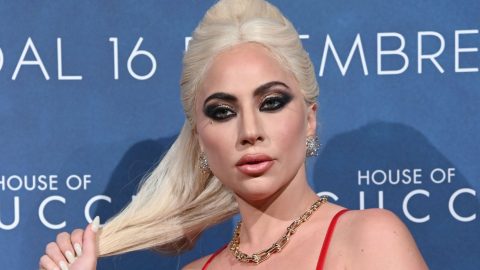NME Music News, Reviews, Videos, Galleries, Tickets and Blogs | NME.COM

There are many things to dwell on during 2020’s wonky, isolated year, but one existential crisis that never truly disappears is that of what it means to call somewhere ‘home’. Being born and raised in a place may tie you to a certain part of the world, but the attachment to the traditions, customs and heritage of that location is a completely different thing entirely.
Stats’ ‘Powys 1999’ deals with that feeling of dislocation expertly. Helmed by Ed Seed, he rounded up his band of Nicole Robson, Stu Barter, John Barrett, Duncan Brow, Iso Waller-Bridge and Ant Whiting last October to head to the region in Wales where he grew up to ponder on the ties that bound him to that part of the world.
The resulting album is typically brilliant electro-pop, with ruminations on the role of nature (‘Come With Me’), the end of the world (‘Kiss Me Like It’s Over’) but never abandons the funky frills heard on 2019’s debut ‘Other People’s Lives’. Meanwhile, ‘Naturalise Me’, Old Flames’ and ‘Out Of Body’ may well be some of the best songs they’ve ever created.
On the eve of the album’s release, we caught up with Seed to chat about previous predictions, his complex relationship with Wales and why this album needs to be played live. But he’ll settle for just really, really loud.
The last album was recorded in a couple of days in a studio, then you pieced it together on the road when you played in Dua Lipa’s live band. Was this one anywhere near as frantic?
“It was differently frantic. Because the first one was just a couple of days off tour then making it on the road with Dua Lipa at my leisure. We didn’t have a label at that point so I was just making it for the joy of making it so there wasn’t any expectation of when it had to be finished. But this time we did have a label, Memphis Industries, and it was the first time I’d made a record knowing that it was going to come out. I had to have more of a plan. I didn’t have that touring time to use, so I had to be more efficient and to have more done in the studio.
How did you end up back home and in Giant Wafer Studio in Wales?
“I knew I’d been wanting to do something about back home and to write about it, then I had to figure out how to communicate that to the band. Tom Andrews, who mixed this and the first album, mentioned Giant Wafer Studios near Newtown, which is where my mum used to work and I bought my first guitar and it just made so much sense.
We got five days there and we had all of the band there. On the first two days we’d jam it out the way we did things before and then work on the loops and find the good bits there and then. Tom had a massive job on his hands because we all had to play with each other in the room and not to be isolated in your own space in headphones; we wanted to feed off each other. It was like living together again, which we hadn’t done since we were on tour. We were in a residential studio so we could go as late as we wanted – it felt so liberating.
We wanted it to be more about playing as if we were live or in a rehearsal, not in a studio. The label said that we had to have most of the songs when we came back, but it wasn’t like I didn’t have anything to write about – I’d been thinking about this for a long time and about how I grew up and when I grew up.”
Kelly Lee Owens recently told NME that she felt the “magic” and heritage of Welsh creativity around her as she grew up. Is that something that you can relate to?
“In school there was a lot of acting and performance and it was just great to have all these different expressive forms – there’s a performing and oral tradition. I loved that stuff. But I also felt detached because my folks weren’t Welsh, they were incomers from England. The border between Powys and England has always shifted a lot – one thing bleeds into the other more so than Pembrokeshire and Snowdonia.
And I was born in Wales, but you are aware that you’re a bit different. I knew that a lot of the traditions were there to be respected and learnt from, but perhaps not taken because I didn’t feel like they were ‘mine’. I think a lot of people have that complex reckoning of trying to work out where you’re from and who you are – that’s very common. The form that my neurosis took was to look at this beautiful landscape, that was everything that I’d ever known, and feeling like I didn’t belong in it somehow.
What about that relationship did you want to communicate on this album?
“I think something that struck me was how constructed where we were growing up was. Like there’s Lake Vyrnwy which is a reservoir, not a lake, but that’s what we call it. An entire village had to be moved so they could make it that way and it was quite a big political struggle to do so. Yet it was regarded as something that was natural and it brought tourists because it is very beautiful – but it pretends to be something that it isn’t. The hills are covered in thousands of acres of pine trees which are planted, but that’s industrial in a way, just in the countryside. You realise that this is not some simple bucolic, isolated paradise, this is a real place with a complicated history of politics and ownership – it just happens to be very pretty. Realising all that stuff and construction made me understand that I feel conflicted about who I am. That fracturing of landscape was quite helpful for me to understand.”
We spoke about the phrase “cosmic domestic” last time – about how the mundanity of home life can bring on a dizzying mindset. Sounds familiar. Got any more predictions you’d like to share?
“I didn’t realise how many songs I’d end up writing about masks! It’s funny listening to ‘Kiss Me Like it’s Over’ now. We recorded that about this time last year and that was the first one that was written, and with the line “kiss me on mouth on the apocalypse“, it feels a bit… yeah. It’s always easy to predict the end of the world though – it’s always on the cards.
The pandemic has really reinforced how close everything is to collapsing…
“The permanence that things seem to have just isn’t there. Especially if you’re under 40 and you’ve probably grown up in your adult life with a great sense of precarious and used to not having long term jobs and to live in a rented flat and probably always will, and you’ve got used to certain things always being true in your own life about it’s riskiness. Then to find out at a stroke that that applies to all the rest of the world too; the political, financial and economic structures have always seemed so permanent and then you see at a stroke that it is contingent. What will be interesting to see is how people who grew up in spite of these things go from here.”

The construction of modern life is a big topic for you in your music…
“I suppose that was what I was thinking about with my parents who wanted to try and do something a bit different when they moved to Wales and Newtown. You even had people like Robert Owen from there, who was the godfather of utopian socialism who went to set up communes all around the world at the time, but people have been trying to do things differently in a long way. But now, you get trapped into tech and finance and think that this is just how it is. If you wanted to live without a phone or a bank account, you just couldn’t function in the world because of how tied up everything is. There’s so much you couldn’t be able to get – because the tech is just assumed. Some of that spirit in terms of practical dreaminess of expanding those horizons is what I tapped into on ‘Powys 1999’ as well.”
How tough is it to be an independent musician to and not be able to play live right now?
“The lack of in-stores is a big one. The Rough Trade show we did on the first album allowed us to have a really great moment for us to be able to celebrate the record with a show like that – which as a bunch of independent musicians is really valuable. And it’s not just the show or selling copies, but having people spread the word for us, which is really hard to do right now. We were never really a massive touring band anyway because it’s so difficult to ship six to eight people around all the time, but we can’t even do a show.
The one thing about this record isn’t very alive until we’ve played them in a show. But we were lucky that we had the goods and the song to work with, If it was halfway during this pandemic, it would have been impossible – the way we work in the studio is like the opposite of social distancing – everyone has to be physically together to connect and affect each other and to spark things up with physical responses.”
Stats’ new album ‘Powys 1999’ is out now via Memphis Industries
The post Stats: “It’s easy to write songs predicting the end of the world – it’s always on the cards” appeared first on NME Music News, Reviews, Videos, Galleries, Tickets and Blogs | NME.COM.




